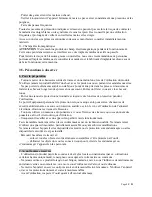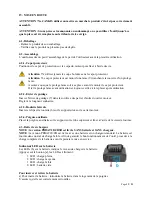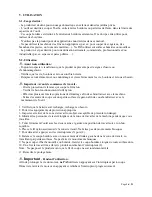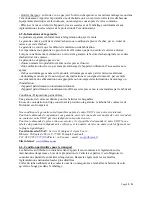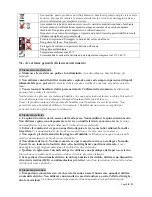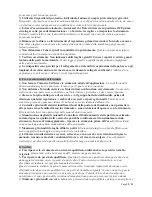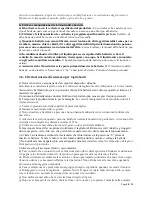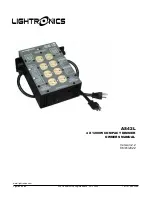
Page
25
/
91
3.3- Safety information about the charger and the battery-pack
Before using the charger and the battery, read all the instructions and cautionary markings on
charger, battery pack and tool.
1) Charger
a) Do not attempt to open or disassemble the charger. If the charger has been dropped or is
damaged in any way, stop using it and do not attempt to repair it.
Return the charger for
repair to an authorized service center or a qualified person, to avoid any danger to the user; or
discard it according to local laws.
b) Protect the charger against any heat source (e.g. direct sunlight exposure, fire, heater…).
To prevent any damage to the charger.
c) Do not expose the charger to water, moisture and cold.
Electric shock hazard.
d) If the power cord or the plug becomes damaged, stop suing the charger until it has been
repaired by a qualified person. If the supply cord is damaged, it must be replaced by the
manufacturer or its authorized service center, in order to avoid a hazard.
Electric shock
hazard.
e) Only use the charger provided with the tool, or a same type or same model charger to
charge the battery. The use of other types of charger increases the risk of electric shock,
personal injury and damage.
f) Never attempt to recharge non-rechargeable batteries. Batteries may explode
g) Only use the charge at ambient temperatures b10
C and +40
C. Store charger in
a dry location protected from cold where temperature would not 40
C. To prevent any
damage to the charger.
h) The charger is intended for indoor use only. Place charger on solid, flat non-flammable
surface and away from any flammable materials when re-charging the battery pack.
Do not recharge the battery pack in a wet or humid environment. The charger and battery
pack may heat during charging process.
2) Battery
a) Do not attempt to open the battery. If the battery is damaged in any way, stop using it
and do not attempt to recharge it.
Short-circuit or electric shock or explosion hazard. Discard
it according to local laws.
b) Protect the battery pack against any heat source (e.g. direct sunlight exposure, fire,
heater…). To prevent any damage or explosion hazard.
c) Do not expose the battery pack to water, moisture and cold. To prevent any damage.
d) In case of damage and improper use of the battery, vapours may be released. Ensure
proper ventilation and provide for fresh air to the work area. The vapours can irritate the
respiratory system.
e) Only use the battery pack provided with the tool. The use of other types of batteries may
increases the risk of electric shock, personal injury and damage.
f) Use only original batteries or recommended by the manufacturer with the voltage
matching your tool, as listed on the nameplate. When using other batteries (e.g. reconditioned
batteries or other brands), there is risk of explosion causing injury or property damage.
g) Charge battery pack only at ambient temperatures b10
C and +40
C. Store the
battery in a dry location protected from cold where temperature would not 40
C. To
prevent any damage to the battery.
h) Do not store or carry a battery in a pocket, toolbox or any other place where it may come
into contact with metal objects. The battery pack terminals may be short-circuited causing
damage to the battery or burns or a fire. Make sure that no conductive material touches the
terminals.

